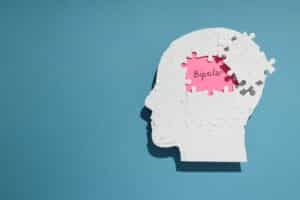If you’ve suffered from depression at one or several points in your life, you are not alone. One study conducted by the National Institute of Mental Health revealed that 16.2 million adults have experienced at least one episode of severe depression.
What is the root source of depression? How do the biological causes of depression interact with our environmental conditions? There are many questions that still need to be answered.
Scientists are making breakthroughs in understanding where depression may come from. One question they’re asking is whether or not depression can be inherited from parents or other family members.
One hopeful finding is that depression is treatable. We strive to provide thorough and holistic care for patients battling depression. To begin, let’s take a look at the possible biological causes of depression.
Is Depression Hereditary?
The word “hereditary” refers to genetic factors that are passed down to offspring. Our genes impact or DNA and RNA, determining what genetic sequences we are born with.
Studies have found that up to 40% of individuals who suffer from depression may have inherited it. In other words, a parent or sibling also displayed symptoms of depression at some point. The question is, does that mean that depression can come from our DNA?
There are a few issues that make this connection difficult to pin down. The first is the simple fact that understanding our genetic makeup and how it influences things like our behavior is complicated. Beyond our DNA, we may be born with genetic variants that can impact everything from our eye color to the way we respond to certain situations.
The second is that not everyone who notes depression in their family medical history will develop symptoms of depression. On the flip side, 60% of people who have depression do not come from a family where depression was present.
Where does that leave our question of biology and depression? To get a better sense of where depression may come from, let’s take a look at other factors.
Epigenetics and Depression
Epigenetics takes a slightly different approach to biology and inherited traits. When studying epigenetics, we look at the way that experiences can interact with our biological makeup. Trauma, in particular, can affect our brain development and our DNA.
Certain events can mute or turn on our genes. In this process, our DNA, itself, remains intact. However, it does impact things like our mental health, affecting the way we are able to react to environmental factors.
It is believed that epigenetic factors can be inherited. To put it simply, it is possible that with the DNA you inherit, you could also inherit those patterns of muted genes. This may lead to an increased risk of developing major depressive symptoms if it runs in your family.
The good news is that epigenetic differences are alterable. With the right treatment, we can change with of your genes are muted and which are turned on. While there is still a lot to learn in this field, it does give us hope (and evidence) that depression is treatable.
Environmental Factors and Depression
One thing we do know is that environmental factors play a huge role in the development of depression. When you’re under constant stress, you feel overwhelmed and oftentimes unfulfilled. Prolonged periods of stress will naturally contribute to our brain chemistry.
Of course, sources of stress can come from all directions. We know that work or seeking employment can become stressful. We know that interpersonal relationships, both romantic and platonic, can cause stress.
What about the environmental factors that we grew up with? How do our families create an environment in which we develop? What environmental factors in childhood can cause depression?
Let’s take a closer look.
Family-Based Trauma
There are certain factors in a child’s life that often prove traumatic. For adults who grew up with family-based trauma, the likelihood of developing depression is considered greater. These factors include:
- Abuse, whether verbal, physical, or sexual
- Neglect, both physical and/or emotional
- The separation of parents or other important caretakers
- Loss of a loved one
- Unstable financial or housing situations, ie parental unemployment, temporary houselessness, etc
While we don’t consider these factors genetic or hereditary, they do contribute to the ways that you may develop depression as a result of your upbringing or familial circumstances.
Growing Up With a Depressed Caretaker
Having a family history of depression can increase your risk of developing depression, as we’ve demonstrated. However, it’s not always entirely inherited in a genetic sense.
When it comes to the caretaker-child relationship, we also look at behavior modeling. As children develop, they look to trusted adults to understand how to react and behave in various circumstances.
If you grew up with a severely depressed caretaker, those symptoms may have become noticeable to you. For example, your caretaker may have stayed in bed or struggled with day-to-day activities when times got tough. As a result, you may have learned to respond to tough situations in a similar way.
Understanding the Biological Causes of Depression Can Help Us Unlock New Approaches to Treatment
There is still a lot that we don’t understand about the biological causes of depression. However, with each breakthrough, we unlock new approaches to treatment. By understanding where depression comes from, we will find greater success in the treatment of each individual patient. At Southern California Sunrise Recovery Center, we stay up to date on the science behind depression. We employ research-based methods of treatment to provide our patients with the best possible tools for recovery. To find out more about what we can do for you, contact us today.







